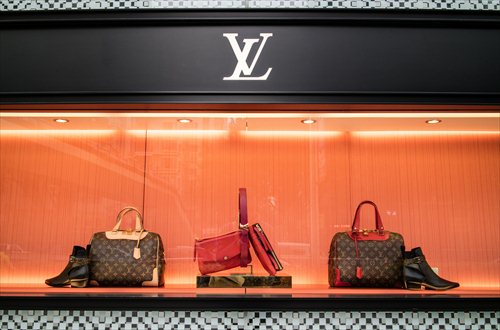Click to buy this bag
As luxury e-commerce grows, so do concerns about quality
China's luxury goods websites have undergone explosive growth in recent years due to the great potential size of the Chinese market. The websites have expanded their product offerings to things like luxury cars and private aircraft, which would have been inconceivable a few years ago. But consumers continue to complain about product quality - a life and death issue for luxury goods vendors. Fierce competition has become the norm in the industry, though luxury goods vendors can still stand out if they focus on particular segments of the market.

Bags and shoes of French luxury brand Louis Vuitton sit on display in a shop window in Fuzhou, capital of East China's Fujian Province in January. Photo: CFP
China's luxury e-commerce provider secoo.com (Secoo) got a lot of attention for a promotional event it held with high-end sports carmaker Lamborghini on May 16, in which it put luxury cars up for sale on its website.
In addition, Secoo CEO Li Rixue delivered a 4 million yuan ($610,800) private aircraft to a consumer who placed the order through Secoo's app.
This activity is just one example of China's booming e-commerce market for luxury goods. Until a few years ago, consumers in China had been reluctant to buy luxury goods online. But now, the idea of buying a plane over the Internet no longer seems so unusual.
For a while, the world's luxury brands have been targeting Chinese consumers, who bought 46 percent of the world's luxury products in 2015, 100 billion yuan more than in 2014, the National Business Daily reported in late 2015.
China's luxury market was worth 113 billion yuan in 2015, compared with 87.1 billion yuan in 2010, according to a report by consulting firm Bain & Company in January.
And buying luxury goods online has grown in popularity. "More and more consumers will choose to shop online for luxury goods due to its convenience and lower prices," said Chen Wei, a senior consultant at Beijing-based ChinaVenture.
"The online luxury goods market made up only 3 percent of the domestic luxury goods market in 2015," the China Business Journal reported in August 2015, citing a senior manager at a major domestic luxury goods website.
About 50 percent of the luxury goods consumption in China will happen online by the end of 2020, accounting firm KPMG estimated in a report released in January.
Investors have also favored luxury goods websites recently. Secoo received $50 million in E-round funding in July 2015, according to media reports.
Quality concerns
"I have bought luxury goods on Secoo and other luxury goods websites several times," a Shanghai-based consumer surnamed Wang told the Global Times on Wednesday.
"But I have only bought stuff that isn't that expensive. For really expensive things, I still like to go to brand stores because I'm afraid of buying knockoffs."
Wang mentioned that one of her friends once bought a Prada bag online that she discovered was a fake two years later. It was a waste of money.
Wang has good reason to be concerned.
First, it is a universal phenomenon that only a few of China's luxury e-commerce sites have been authorized by big luxury brands.
"No authorization means that luxury goods websites can't ensure adequate supply and product quality," Chen told the Global Times on Wednesday.
"Consumers usually do not have the ability to recognize high-quality fakes, so authorization can dispel their misgivings."
"Due to this, most of the products sold on luxury websites were bought abroad by the appointed buyers of these websites," Chen said, noting that some websites even sell low-quality luxury products at high prices. "This is also kind of deceptive."
After-sales service is another troublesome quality issue. When a customer isn't happy with an item bought from a brand store, he can always take it back for a refund or exchange.
"But that isn't very easy when it happens online," Chen said, noting that returning a product online can take a lot of time and energy.
Li, Secoo's CEO, offered a solution to the problem.
"We have built offline experience stores in major cities such as Beijing and Shanghai where consumers can touch products before buying them online and get help with products they have already bought online," he said.
This kind of one-stop service model can help solve the after-sales service problem and bring in consumers, Chen said. "But this model is still rare in China's luxury e-commerce industry," he noted.
Price fight
There is a lot of competition in China's luxury e-commerce market, so price wars are common.
Secoo had one with competing luxury website zhen.com in July 2015. A Prada bag that sold for 17,300 yuan at retail was priced at 9,980 yuan on Secoo and as low as 6,999 yuan on zhen.com, baijia.baidu.com reported on July 8, 2015, noting that Secoo was also selling 49 Chanel bags at discounts ranging from 10 percent to 60 percent.
Luxury e-commerce providers can't earn much profit by offering such steep discounts. "Besides, they lose customers once prices return to normal," Chen said.
However, Chen didn't deny that some consumers may turn into fans of these websites after buying some bargain goods from them.
Li said the discount is a tactic in a company's strategy for gaining market share. "This can't last long," he told the Global Times on May 16.
In Li's view, the high rate of customer flow turning into cash flow is more important, though he refused to disclose the figure for his company.
In addition, the luxury e-commerce vendors also face fierce competition from China's e-commerce giants such as Tmall and jd.com, which have bigger platforms for luxury goods.
Nonetheless, China's luxury goods websites can remain competitive by cultivating niches within the market.
"Focus on a category is the key," Chen said.